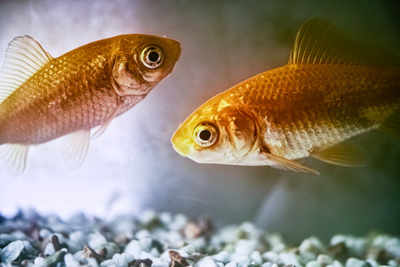- News
- lifestyle
- relationships
- pets
- Releasing aquarium fish in ponds poses danger
Trending
This story is from July 17, 2015
Releasing aquarium fish in ponds poses danger
For the authorities of Behala's Swamiji Sadak Young Bengal Club, last year's Durga Puja was unlike any other.

For the authorities of Behala's Swamiji Sadak Young Bengal Club, last year's Durga Puja was unlike any other.
The fish-like creature they found in the club pond not only left them bewildered, but also made them notice a steep decline in the number of fishes. Most of the commonly found dwarf fish and fries were missing. The three-foot long creature was later identified as a plecostomus, commonly known as crocodile fish.Native to South America, the fish can be commonly spotted in the water bodies of various southeast Asian countries including India, thanks to aquarium lovers.
Fish enthusiasts have been releasing exotic fishes from their aquariums into local lakes and ponds for multiple reasons, causing massive danger to the environment. Some common reasons include the increasing size of a fish, boredom from a certain type of fish or relocation of aquarium owners. Releasing aquarium fish into bigger water bodies allow them to grow in size, which lets smaller local fish fall prey to the overgrown exotic species.
Gautam Guptaa, an expert fish keeper and consultant said, "Many fish keepers do not follow the basic ethics of fish-keeping. They either don't know the consequences or do not care. I know some hobbyists who release different fishes in ponds regularly ." There are even cases of piranha being found in local ponds.
"Even 10 years ago, one could find different varieties of barbs (puti) in the local ponds. Now, there are none. The numbers of fish in the ponds is going down day by day and we are running out of options," Subhash added. The fisherman also pointed out that different types of cat fish, exotic carps, cichlids and goldfish are often found in city ponds.
Acknowledging the problem, West Bengal Biodiversity Board Chairman Asok Kanti Sanyal said that though there has not been any study on it, but negative results have come from other adjacent districts. These invasive alien fish are artificially introduced in the environment. The primary victims of this trend are the native fish, which are either eaten up or lose their habi tat due to t h e aggressive and fast spawning exotic fishes.
Sanyal said that fis hes like tilapiine cichlid (tilapia) and African catfish (rakhhushe magur) are fre quently found destroying local fish in Kolkata ponds. Though the African cat fish is not released by aquarists, til apines are.
There are hundreds of species of tilapiine in the world and many of them are kept in aquariums for their colourful features. Tilapia, a part of Bengal's cuisine, is widely believed to be introduced in the state by a fish keeper in 1970s. Commercial culture of the fish grew from 1990s.
Extinction of local fish is not only damaging the environment, but also posing a threat to fishermen like Subhash. Environmentalists feel that any fish which is not indigenous does not go with the local ecology . Moreover, they destroy local fish that have economic value.
Environmentalist Biswajit Roy Chowdhury said that along with other adverse conditions like pollution and water body encroachment, these alien fish are taking a toll on the local fish population. He said that using local species in aquariums instead of exotic fishes can save their lives as well as the ecological balance. “Species like banded gourami (kholse) and scat are beautiful and ideal for aquariums. If these fish are used in aquariums, it will be a great contribution to the local environment,“ he urged.
However, Madhumita Mukherjee, additional director of the state fisheries department, said ornamental fishes like exotic carps and cichlids are not causing harm to the environment. She feels exotic fishes like flowerhorn and arwana, that eat up other local species, are too expensive to be thrown away by pet lovers.
- Instead of releasing :
- Return them to any local pet shop for resale or trade - Give them to another hobbyist, an aquarium in a professional office, a museum, or to a public aquarium or zoological park - Donate them to a public institution
- School, nursing home, hospital, or prison - If these options don’t work out, a veterinarian or fishery biologist can euthanize it (put it to sleep)
- Commonly-found exotic fishes in local ponds :
- African Cat fish - Paku and piranha - Different types of exotic carps - Crocodile fish - Different cichlids
For more stories, follow us on Twitter and Facebook
The fish-like creature they found in the club pond not only left them bewildered, but also made them notice a steep decline in the number of fishes. Most of the commonly found dwarf fish and fries were missing. The three-foot long creature was later identified as a plecostomus, commonly known as crocodile fish.Native to South America, the fish can be commonly spotted in the water bodies of various southeast Asian countries including India, thanks to aquarium lovers.
Fish enthusiasts have been releasing exotic fishes from their aquariums into local lakes and ponds for multiple reasons, causing massive danger to the environment. Some common reasons include the increasing size of a fish, boredom from a certain type of fish or relocation of aquarium owners. Releasing aquarium fish into bigger water bodies allow them to grow in size, which lets smaller local fish fall prey to the overgrown exotic species.
Gautam Guptaa, an expert fish keeper and consultant said, "Many fish keepers do not follow the basic ethics of fish-keeping. They either don't know the consequences or do not care. I know some hobbyists who release different fishes in ponds regularly ." There are even cases of piranha being found in local ponds.
Many water bodies in the city are becoming infested with exotic ornamental fishes, which have no economic value. Subhash Dolui, a contractual fisherman, who has been catching fish in and around Kolkata for last 18 years, said that in the last five years he has caught at least five ornamental fishes in every pond he came across. As a result of this, the number of local fish is fast decreasing.
"Even 10 years ago, one could find different varieties of barbs (puti) in the local ponds. Now, there are none. The numbers of fish in the ponds is going down day by day and we are running out of options," Subhash added. The fisherman also pointed out that different types of cat fish, exotic carps, cichlids and goldfish are often found in city ponds.
Acknowledging the problem, West Bengal Biodiversity Board Chairman Asok Kanti Sanyal said that though there has not been any study on it, but negative results have come from other adjacent districts. These invasive alien fish are artificially introduced in the environment. The primary victims of this trend are the native fish, which are either eaten up or lose their habi tat due to t h e aggressive and fast spawning exotic fishes.
Sanyal said that fis hes like tilapiine cichlid (tilapia) and African catfish (rakhhushe magur) are fre quently found destroying local fish in Kolkata ponds. Though the African cat fish is not released by aquarists, til apines are.
There are hundreds of species of tilapiine in the world and many of them are kept in aquariums for their colourful features. Tilapia, a part of Bengal's cuisine, is widely believed to be introduced in the state by a fish keeper in 1970s. Commercial culture of the fish grew from 1990s.
Extinction of local fish is not only damaging the environment, but also posing a threat to fishermen like Subhash. Environmentalists feel that any fish which is not indigenous does not go with the local ecology . Moreover, they destroy local fish that have economic value.
Environmentalist Biswajit Roy Chowdhury said that along with other adverse conditions like pollution and water body encroachment, these alien fish are taking a toll on the local fish population. He said that using local species in aquariums instead of exotic fishes can save their lives as well as the ecological balance. “Species like banded gourami (kholse) and scat are beautiful and ideal for aquariums. If these fish are used in aquariums, it will be a great contribution to the local environment,“ he urged.
However, Madhumita Mukherjee, additional director of the state fisheries department, said ornamental fishes like exotic carps and cichlids are not causing harm to the environment. She feels exotic fishes like flowerhorn and arwana, that eat up other local species, are too expensive to be thrown away by pet lovers.
- Instead of releasing :
- Return them to any local pet shop for resale or trade - Give them to another hobbyist, an aquarium in a professional office, a museum, or to a public aquarium or zoological park - Donate them to a public institution
- School, nursing home, hospital, or prison - If these options don’t work out, a veterinarian or fishery biologist can euthanize it (put it to sleep)
- Commonly-found exotic fishes in local ponds :
- African Cat fish - Paku and piranha - Different types of exotic carps - Crocodile fish - Different cichlids
For more stories, follow us on Twitter and Facebook
End of Article
FOLLOW US ON SOCIAL MEDIA









